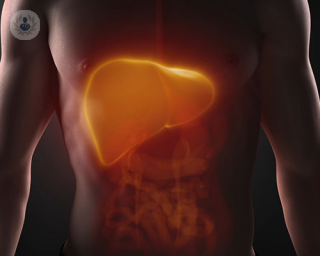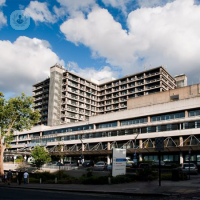Alcoholic liver disease
Professor Kevin Peter Moore - Hepatology (liver specialist)
Created on: 03-01-2017
Updated on: 10-17-2023
Edited by: Aoife Maguire

What is alcoholic liver disease?
Alcoholic liver disease (also known as ARLD) is caused by excess alcohol consumption, which damages the liver because of a build-up of fat and leads to scarring and inflammation. The liver usually regenerates itself but in drinking too much alcohol, over time it can cease to properly function and can even be fatal if not treated in the early stages. Completely stopping alcohol consumption is the only chance a person has at recovery.
There are four stages: alcoholic fatty liver disease, alcoholic hepatitis, fibrosis and cirrhosis. The sooner any signs of disease are detected, and the sooner the alcohol consumption is reduced or ceased, the better the chance of recovery.
What are the symptoms of alcoholic liver disease?
The early warning signs of the disease include:
- Pain in the abdomen
- Nausea and vomiting
- Decreased appetite
Once it advances to the later stages of the disease, the following symptoms occur:
- Jaundice - yellowing of the whites of the eyes and the skin
- Swelling of lower limbs
- Fever and shivering
- Itchy skin
- Significant weight loss
- Weakness of muscles
- Blood in vomit and stools
How is alcoholic liver disease treated?
The first thing is that all alcohol consumption has to completely stop. This can reverse some of the damage in early-stage alcoholic liver disease. You will never be able to drink alcohol again because it will reverse any healing progress.
For some people who depend on alcohol, professional help from a gastroenterologist will be required. Talking therapy such as cognitive behavioural therapy (CBT) can be used in conjunction with medications used to treat symptoms of withdrawal. For those who are seriously addicted to alcohol, they may find a rehabilitation program most useful.
Other treatment may include taking certain medications, such as corticosteroids whilst in hospital as well as making lifestyle changes like quitting smoking.
In patients with liver failure as an outcome of advanced-stage liver disease, a liver transplant is the only option as a chance of survival. They have to be able to abstain from alcohol for longer than six months before the transplantation so that they are healthy enough to undergo surgery.
Liver transplant depends on whether there is a donor available who is a suitable match for the patient.
What is the outlook for alcoholic liver disease?
As the condition progresses to each stage of the disease, the patient's life expectancy decreases. Those with the less severe stage of the disease will have a chance of living longer provided that they give up alcohol. Alcoholic liver disease can also be is treated by a hepatologist, as well as a gastroenterologist.














